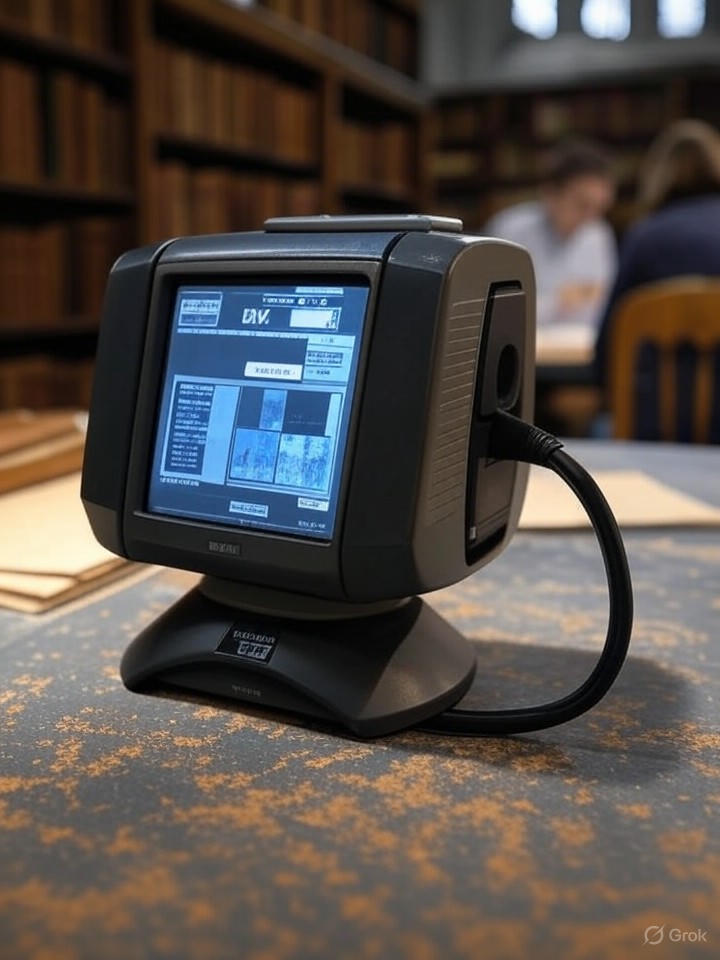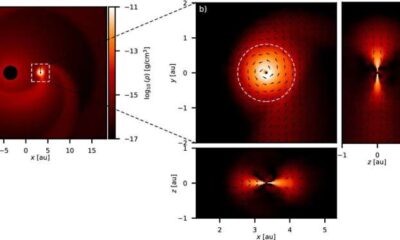Science
Cambridge Festival Revives Floppy Disks for Digital Preservation

In a unique event held on October 9, 2023, at Cambridge University Library, the Festival of Floppies focused on reviving obsolete floppy disks to address the growing concern of digital preservation. Organized under the Future Nostalgia project, this gathering attracted archivists, retro-computing enthusiasts, and conservation experts dedicated to safeguarding the fragile legacy of these once-ubiquitous storage devices.
The festival provided attendees with hands-on workshops that featured the use of specialized tools like the KryoFlux. This device captures raw magnetic flux data from floppy disks, ensuring the preservation of not only files but also the disks’ essential structures. As these disks become increasingly vulnerable to degradation due to mold, dust, and magnetic decay, the urgency for preservation efforts has never been more apparent.
Leontien Talboom, a key figure in Cambridge’s digital preservation team, stressed the importance of expert intervention to prevent these cultural artifacts from becoming inaccessible. The event emphasized that floppy disks contain irreplaceable items, including personal letters and early digital art, which are at risk of being lost forever.
Reviving Forgotten Bytes: The Spirit of Collaboration
Collaboration was a central theme of the festival, attracting a diverse range of participants from libraries, archives, and even gaming communities. Presenters shared valuable insights on ethical considerations in data recovery and innovative techniques for cleaning contaminated disks. One notable presentation addressed the challenges posed by non-standard formats, demonstrating how retro-computing enthusiasts’ trial-and-error experiences have become essential for professional archivists.
Practical sessions on disk imaging workflows highlighted the need for standardized best practices, reinforcing the festival’s role as a platform for knowledge exchange. According to a blog post on the Digital Preservation at Cambridge University Libraries, attendees shared their experiences of “disk disasters” and successes, such as recovering data from seemingly ruined media. This communal learning spirit is vital, especially as floppy disks frequently enter collections from retiring donors or the estates of deceased individuals, often containing historically significant materials, including documents from renowned physicist Stephen Hawking.
Technical Innovations and Future Implications
The festival featured technical demonstrations that showcased advanced tools necessary for effective preservation. Participants learned why consumer-grade USB drives are inadequate for archival purposes. The KryoFlux allows for bit-level imaging, facilitating the creation of accurate digital replicas that can be analyzed and migrated to modern formats. Additionally, software such as the HxC Floppy Emulator was demonstrated, enabling access to locked files by emulating old hardware environments.
Discussions also explored broader implications for digital heritage, including the environmental considerations of preserving physical media compared to migrating to cloud storage solutions. The event served not only to celebrate floppy disks as historical artifacts but also as gateways to personal and cultural histories, with artistic installations reflecting the pixelated aesthetics of the era.
As the festival concluded, it became clear that the Festival of Floppies could serve as a model for similar initiatives across the globe, addressing concerns about a potential “digital dark age.” By documenting workflows and sharing resources, Cambridge aims to empower smaller institutions lacking specialized equipment. Talboom highlighted successful efforts at the library, such as imaging disks that contained unpublished manuscripts and early software prototypes.
The legacy of the festival extends to advocating for necessary funding and training in digital preservation, ensuring that the data of today does not become obsolete tomorrow. As floppy disks fade from memory, the knowledge gained during this event—merging nostalgia with cutting-edge technology—provides a roadmap for protecting our evolving digital heritage and emphasizes that preservation is as much about innovation as it is about memory.
-

 Science2 months ago
Science2 months agoUniversity of Hawaiʻi at Mānoa Joins $25.6M AI Initiative for Disaster Monitoring
-

 Health2 months ago
Health2 months agoNew Gel Offers Hope for Regrowing Tooth Enamel in Dentistry
-

 Science1 month ago
Science1 month agoALMA Discovers Companion Orbiting Red Giant Star π 1 Gruis
-

 Lifestyle1 month ago
Lifestyle1 month agoPark Jung Min’s Endearing Moment with Hwasa Steals Show at Awards
-

 Science2 months ago
Science2 months agoIROS 2025 to Showcase Cutting-Edge Robotics Innovations in China
-

 Lifestyle2 months ago
Lifestyle2 months agoStone Island’s Logo Worn by Extremists Sparks Brand Dilemma
-

 Lifestyle2 months ago
Lifestyle2 months agoSampson County Celebrates Susie Faison’s 100th Birthday Milestone
-

 Health2 months ago
Health2 months agoStartup Liberate Bio Secures $31 Million for Next-Gen Therapies
-

 Lifestyle2 months ago
Lifestyle2 months agoMary Morgan Jackson Crowned Little Miss National Peanut Festival 2025
-

 Health2 months ago
Health2 months agoTop Hyaluronic Acid Serums for Radiant Skin in 2025
-

 Politics2 months ago
Politics2 months agoJudge Considers Dismissal of Chelsea Housing Case Citing AI Flaws
-

 World2 months ago
World2 months agoBravo Company Veterans Honored with Bronze Medals After 56 Years









